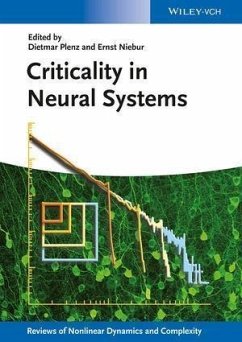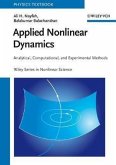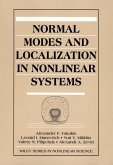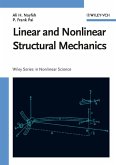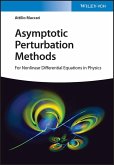Criticality in Neural Systems (eBook, PDF)
Redaktion: Plenz, Dietmar; Niebur, Ernst


Alle Infos zum eBook verschenken

Criticality in Neural Systems (eBook, PDF)
Redaktion: Plenz, Dietmar; Niebur, Ernst
- Format: PDF
- Merkliste
- Auf die Merkliste
- Bewerten Bewerten
- Teilen
- Produkt teilen
- Produkterinnerung
- Produkterinnerung

Hier können Sie sich einloggen

Bitte loggen Sie sich zunächst in Ihr Kundenkonto ein oder registrieren Sie sich bei bücher.de, um das eBook-Abo tolino select nutzen zu können.
Neurowissenschaftler suchen nach Antworten auf die Fragen, wie wir lernen und Information speichern, welche Prozesse im Gehirn verantwortlich sind und in welchem Zeitrahmen diese ablaufen. Die Konzepte, die aus der Physik kommen und weiterentwickelt werden, können in Medizin und Soziologie, aber auch in Robotik und Bildanalyse Anwendung finden. Zentrales Thema dieses Buches sind die sogenannten kritischen Phänomene im Gehirn. Diese werden mithilfe mathematischer und physikalischer Modelle beschrieben, mit denen man auch Erdbeben, Waldbrände oder die Ausbreitung von Epidemien modellieren kann.…mehr
- Geräte: PC
- mit Kopierschutz
- eBook Hilfe
- Größe: 24.95MB
![Criticality in Neural Systems (eBook, ePUB) Criticality in Neural Systems (eBook, ePUB)]() Criticality in Neural Systems (eBook, ePUB)156,99 €
Criticality in Neural Systems (eBook, ePUB)156,99 €![Anomalous Transport (eBook, PDF) Anomalous Transport (eBook, PDF)]() Anomalous Transport (eBook, PDF)183,99 €
Anomalous Transport (eBook, PDF)183,99 €![Applied Nonlinear Dynamics (eBook, PDF) Applied Nonlinear Dynamics (eBook, PDF)]() Ali H. NayfehApplied Nonlinear Dynamics (eBook, PDF)162,99 €
Ali H. NayfehApplied Nonlinear Dynamics (eBook, PDF)162,99 €![Reviews of Nonlinear Dynamics and Complexity (eBook, PDF) Reviews of Nonlinear Dynamics and Complexity (eBook, PDF)]() Reviews of Nonlinear Dynamics and Complexity (eBook, PDF)138,99 €
Reviews of Nonlinear Dynamics and Complexity (eBook, PDF)138,99 €![Normal Modes and Localization in Nonlinear Systems (eBook, PDF) Normal Modes and Localization in Nonlinear Systems (eBook, PDF)]() Alexander F. VakakisNormal Modes and Localization in Nonlinear Systems (eBook, PDF)88,99 €
Alexander F. VakakisNormal Modes and Localization in Nonlinear Systems (eBook, PDF)88,99 €![Linear and Nonlinear Structural Mechanics (eBook, PDF) Linear and Nonlinear Structural Mechanics (eBook, PDF)]() Ali H. NayfehLinear and Nonlinear Structural Mechanics (eBook, PDF)133,99 €
Ali H. NayfehLinear and Nonlinear Structural Mechanics (eBook, PDF)133,99 €![Asymptotic Perturbation Methods (eBook, PDF) Asymptotic Perturbation Methods (eBook, PDF)]() Attilio MaccariAsymptotic Perturbation Methods (eBook, PDF)115,99 €
Attilio MaccariAsymptotic Perturbation Methods (eBook, PDF)115,99 €-
-
-
Dieser Download kann aus rechtlichen Gründen nur mit Rechnungsadresse in A, B, BG, CY, CZ, D, DK, EW, E, FIN, F, GR, HR, H, IRL, I, LT, L, LR, M, NL, PL, P, R, S, SLO, SK ausgeliefert werden.
- Produktdetails
- Verlag: Ernst & Sohn
- Seitenzahl: 592
- Erscheinungstermin: 24. März 2014
- Englisch
- ISBN-13: 9783527651030
- Artikelnr.: 41117668
- Verlag: Ernst & Sohn
- Seitenzahl: 592
- Erscheinungstermin: 24. März 2014
- Englisch
- ISBN-13: 9783527651030
- Artikelnr.: 41117668
- Herstellerkennzeichnung Die Herstellerinformationen sind derzeit nicht verfügbar.
ERNST NIEBUR is Professor of Neuroscience and of Brain and Psychological Sciences at Johns Hopkins University in Baltimore, USA. He holds degrees in Physics from the Universities of Dortmund, Germany and Lausanne, Switzerland, and a postgraduate certificate in Artificial Intelligence from the Swiss Federal Institute of Technology (EPFL). Prof. Niebur has authored more than 100 scientific articles in physics and computational neuroscience.
HEINZ GEORG SCHUSTER is Professor (em.) of Theoretical Physics at the University of Kiel in Germany. At the beginning of his academic career, he was appointed Professor at the University of Frankfurt am Main in Germany. He was a visiting professor at the Weizmann-Institute of Science in Israel and at the California Institute of Technology in Pasadena, USA. He is author and editor of research monographs and topical handbooks on chaos theory, nonlinear dynamics and neural networks, but also on popular science books, and editor of a Wiley series on Nonlinear Physics and Complexity.
Dietmar Plenz
The Dynamic Brain in Action: Coordinative Structures,
Criticality and Coordination Dynamics
J. A. Scott Kelso
Critical Brain Dynamics at Large Scale
Dante R Chialvo
The Correlation of the Neuronal Long-range Temporal Correlations, Avalanche Dynamics with the Behavioral Scaling Laws and Interindividual Variability
J. Matias Palva and Satu Palva
The Turbulent Human Brain
Arnold. J. Mandell, Stephen E. Robinson, Karen A. Selz, Constance Schrader, Tom Holroyd and Richard Coppola
Thermodynamic Model of Criticality in the Cortex Based on EEG/ECoG Data
Robert Kozma, Marko Puljic and Walter J. Freeman
Neuronal Avalanches in the Human Brain
Oren Shriki and Dietmar Plenz
Critical Slowing and Perception
Karl Friston, Michael Breakspear and Gustavo Deco
Self-organized Criticality in Neural Network Models
Matthias Rybarsch and Stefan Bornholdt
Single Neuron Response Fluctuations: A Self-organized Criticality Point of View
Asaf Gal and Shimon Marom
Activity Dependent Model for Neuronal Avalanches
Lucilla de Arcangelis and Hans J. Herrmann
The Neuronal Network Oscillation as a Critical Phenomenon
Richard Hardstone, Huibert D. Mansvelder, Klaus Linkenkaer-Hansen
Critical Exponents, Universality Class & Thermodynamic: The "Temperature" Of the Brain
Shan Yu, Hongdian Yang, Oren Shriki and Dietmar Plenz
Peak Variability and Optimal Performance in Cortical Networks at Criticality
Hongdian Yang, Woodrow L. Shew, Rajarshy Roy, and Dietmar Plenz
Criticality At Work: How Do Critical Networks Respond to Stimuli?
Mauro Copelli
Critical Dynamics in Complex Networks
Daniel B. Larremore, Woodrow L. Shew, Juan G. Restrepo
Mechanisms of Self-organized Criticality in Adaptive Networks
Thilo Gross, Anne-Ly Do, Felix Droste, and Christian Meisel
Cortical Networks with Lognormal Synaptic Connectivity and their Implications in Neuronal Avalanches
Tomoki Fukai, Vladimir Klinshov and Jun-nosuke Teramae
Jump Right In: Transitions to Criticality in Neural Systems with Dynamic Synapses
Anna Levina, J. Michael Herrmann, Theo Geisel
Non-conservative Neuronal Networks During Up states Self-organize Near Critical Points
Stefan Mihalas, Daniel Millman, Ramakrishnan Iyer, Alfredo Kirkwood and Ernst Niebur
Self-organized Criticality and Near Criticality in Neural Networks
J. D. Cowan, J. Neuman, and W. van Drongelen
Neural Dynamics: Criticality, Cooperation, Avalanches and Entrainment between Complex Networks
P. Grigolini, M. Zare, A. Svenkeson, B. J. West
Complex Networks: From Social Crises to Neuronal Avalanches
B. J. West, M. Turalska and P. Grigolini
The Dynamics of Neuromodulation
Gerhard Werner and Bernhard J. Mitterauer
Dietmar Plenz
The Dynamic Brain in Action: Coordinative Structures,
Criticality and Coordination Dynamics
J. A. Scott Kelso
Critical Brain Dynamics at Large Scale
Dante R Chialvo
The Correlation of the Neuronal Long-range Temporal Correlations, Avalanche Dynamics with the Behavioral Scaling Laws and Interindividual Variability
J. Matias Palva and Satu Palva
The Turbulent Human Brain
Arnold. J. Mandell, Stephen E. Robinson, Karen A. Selz, Constance Schrader, Tom Holroyd and Richard Coppola
Thermodynamic Model of Criticality in the Cortex Based on EEG/ECoG Data
Robert Kozma, Marko Puljic and Walter J. Freeman
Neuronal Avalanches in the Human Brain
Oren Shriki and Dietmar Plenz
Critical Slowing and Perception
Karl Friston, Michael Breakspear and Gustavo Deco
Self-organized Criticality in Neural Network Models
Matthias Rybarsch and Stefan Bornholdt
Single Neuron Response Fluctuations: A Self-organized Criticality Point of View
Asaf Gal and Shimon Marom
Activity Dependent Model for Neuronal Avalanches
Lucilla de Arcangelis and Hans J. Herrmann
The Neuronal Network Oscillation as a Critical Phenomenon
Richard Hardstone, Huibert D. Mansvelder, Klaus Linkenkaer-Hansen
Critical Exponents, Universality Class & Thermodynamic: The "Temperature" Of the Brain
Shan Yu, Hongdian Yang, Oren Shriki and Dietmar Plenz
Peak Variability and Optimal Performance in Cortical Networks at Criticality
Hongdian Yang, Woodrow L. Shew, Rajarshy Roy, and Dietmar Plenz
Criticality At Work: How Do Critical Networks Respond to Stimuli?
Mauro Copelli
Critical Dynamics in Complex Networks
Daniel B. Larremore, Woodrow L. Shew, Juan G. Restrepo
Mechanisms of Self-organized Criticality in Adaptive Networks
Thilo Gross, Anne-Ly Do, Felix Droste, and Christian Meisel
Cortical Networks with Lognormal Synaptic Connectivity and their Implications in Neuronal Avalanches
Tomoki Fukai, Vladimir Klinshov and Jun-nosuke Teramae
Jump Right In: Transitions to Criticality in Neural Systems with Dynamic Synapses
Anna Levina, J. Michael Herrmann, Theo Geisel
Non-conservative Neuronal Networks During Up states Self-organize Near Critical Points
Stefan Mihalas, Daniel Millman, Ramakrishnan Iyer, Alfredo Kirkwood and Ernst Niebur
Self-organized Criticality and Near Criticality in Neural Networks
J. D. Cowan, J. Neuman, and W. van Drongelen
Neural Dynamics: Criticality, Cooperation, Avalanches and Entrainment between Complex Networks
P. Grigolini, M. Zare, A. Svenkeson, B. J. West
Complex Networks: From Social Crises to Neuronal Avalanches
B. J. West, M. Turalska and P. Grigolini
The Dynamics of Neuromodulation
Gerhard Werner and Bernhard J. Mitterauer
